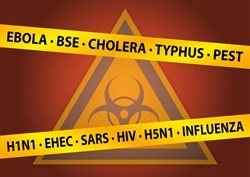Professor Guy Richards and Professor Adriano G. Duse will address at the Wits Faculty of Health Sciences 10th Prestigious Research Lecture at 5pm on 30 June 2014 at the Wits Public Health Auditorium in Parktown, Johannesburg on the subject of 'Superbugs'.

© PixelPower - Fotolia.com
People the world over are admitted to hospital for a particular problem and acquire secondary infections there, which can be fatal. In Africa, outbreaks of deadly viruses, such as Ebola and Marburg, are on the increase, causing a rising number of fatalities over the past ten years.
"Superbugs are microorganisms, such as viruses and bacteria, which modern medicine is struggling to combat because they are becoming increasingly virulent and resistant to antibiotics or vaccines. At the same time, very few new drugs or vaccines are coming out of the pharmaceutical pipeline," explains Professor Duse, the head of Clinical Microbiology and Infectious Diseases, School of Pathology in the Faculty of Health Sciences, Wits University.
"We are talking about a crisis where people in ever-greater numbers are no longer responding to the available treatments and the problem is growing, with disastrous consequences. This is largely as a result of the abuse of antibiotics - both their incorrect prescription and over-prescription," adds Professor Guy Richards, the academic head of the Division of Critical Care in the Faculty of Health Sciences, Wits University and the director of the Department of Critical Care at the Charlotte Maxeke Johannesburg Academic Hospital.
Circumspection required in administering antibiotics
In short, antibiotic abuse destroys people's infection-fighting, good bacteria and replaces them with hostile, antibiotic resistant bacteria or superbugs.
Professor Richards is strict about the administering of antibiotics. "All doctors, veterinarians and hospitals have to become extremely circumspect about when and for what they prescribe an antibiotic and which antibiotic they prescribe, because we are at the end of the antibiotic era. Pharmaceutical companies are not producing new generations of antibiotics because it is not profitable for them and we therefore have to make sure that we extend the lifespan of existing antibiotics."
He says that doctors and hospitals that do not pay immediate attention to this are exacerbating the infection crisis in communities and hospitals worldwide. Vets, too, have to play their role. "Antibiotics are used in certain livestock situations, as growth simulants and the overuse of them leads to the growth of resistant superbugs, which are easily passed from animal to person and from person to person, or they make their way into the sewer systems and multiply."
Haemorrhagic fevers increase
"The health of humans is inextricably linked to the health of animals and the environment. Addressing the connections between health and the environment requires an urgent expansion of interdisciplinary collaborations and strong political and global will," adds Professor Duse who will be focusing on the challenges posed by agents that cause viral haemorrhagic fevers such as the Ebola and Marburg viruses.
Duse has first-hand of experience of people infected by these killer viruses. In December 2012, Professor Duse was appointed World Health Organisation expert consultant for the Infection Control Group for the Ebola haemorrhagic fever outbreak response team in Uganda. In April 2014, he was deployed to Liberia to assist with the containment of the Ebola virus outbreak.
Nosocomial infections information not shared
"We are seeing an increase in both fatal infections and in infections that used to be curable but are no longer, as well as an increase in hospital-acquired infections or what we call nosocomial infections," continues Professor Richards, who cites the following studies:
The European Prevalence of Infection (EPIC) study demonstrated 21% of patients in ICUs had nosocomial sepsis, the European Study of GN Infection (ESGNI)-007 found an overall infection rate of 9.9% and the ESGNI-008 study found an overall infection rate of 26.8% post-major heart surgery.
"There are more than two million nosocomial infections per year in the US, with 90 000 deaths and annual hospital costs of US$ 5.7 billion," says Professor Richards, who believes that certain hospital groups and medical aids in South Africa have data on nosocomial infection rates in South Africa that has not been shared with the public.
"Our levels of resistance and infection are possibly higher than the UK or US because our infection control practices are not always as specific as they should be," he suggests.
"Every hospital and every ward has a different microbe profile and it is critical to know what bacteria or viruses patients are likely to encounter in each unit, in order to be precise about the type of antibiotics prescribed. This is especially critical in ICU where patients are seriously ill or at risk and their immune systems are often already compromised.
"In addition, hospital staff need to take extreme care to follow anti-infection protocol because infections are all too easily contracted, either intravenously or via other procedures," he concludes.
To book for this public discussion, call Nomfundo Sibiya on +27 (0)11 717 2751 or email az.ca.stiw@ayibis.odnufmoN. For more information, go to www.wits.ac.za/health/hsro/prl10.
































